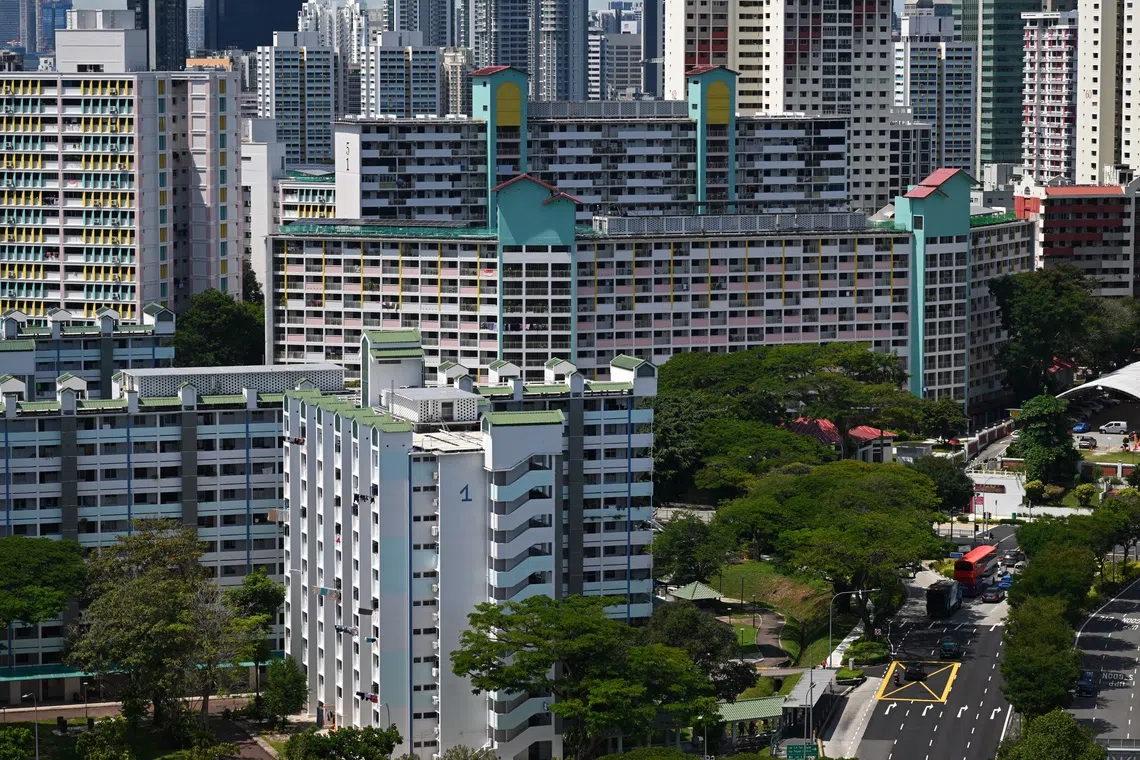Vers should not create ‘lottery effect’ or be a wealth-generating programme: Chee Hong Tat
Sign up now: Get ST's newsletters delivered to your inbox

Currently, about 2.5 per cent of HDB households do not own flats that cover the owners till they are at least 95 years old.
ST PHOTO: KUA CHEE SIONG
- Vers aims to redevelop older HDB estates, avoiding a "lottery effect" or wealth generation, with lower compensation than Sers.
- MND is studying Vers details like voting and relocation, ensuring orderly redevelopment and minimising disruption to residents.
- Vers addresses lease concerns so Singaporeans have homes for life, maintaining fairness across generations with land returning to the state.
AI generated
SINGAPORE – The Voluntary Early Redevelopment Scheme (Vers)
He was responding to questions from Mr Foo Cexiang (Tanjong Pagar GRC) and Workers’ Party Non-Constituency MP Andre Low on the scheme, which facilitates the redevelopment of selected Housing Board precincts before their 99-year leases end.
Mr Chee said he agreed with the views of both MPs about Vers – Mr Foo had asked if the scheme would have a lottery effect, while Mr Low sought assurance that it would primarily be an orderly renewal programme, and not a wealth-generating one.
The minister emphasised that compensation packages for Vers will be lower than those offered under the Selective En bloc Redevelopment Scheme (Sers).
HDB residents whose flats were acquired under Sers could purchase a new flat on a fresh 99-year lease at a replacement site before their existing leases expired, often at little to no extra cost.
This led many HDB dwellers to view Sers as a “guaranteed” windfall, and at one point a number of HDB flats with short remaining leases changed hands for high prices in the resale market, possibly to reap benefits of the scheme.
Mr Chee noted that Sers is a compulsory scheme for selected precincts with high redevelopment potential, while Vers is to space out the redevelopment of older towns over time and will be voluntary.
“Flats offered Vers will have shorter remaining leases compared with the flats which were previously offered Sers, so the overall compensation for Vers would be lower compared with Sers,” he said, adding that his ministry is working out details of the compensation package.
“Just as how the valuation of flats varies today, the compensation amount would similarly vary across different Vers sites and flats,” said Mr Chee, who in August said there are no plans for further projects under Sers
He added that the Ministry of National Development (MND) is studying details of Vers such as the voting process and how to support the various demographic groups across different sites with relocation options.
One of the three key considerations of the scheme, said Mr Chee, is that its primary purpose is to facilitate the orderly redevelopment of towns where many older flats were built within short periods of time.
He said this would allow redevelopment works to be carried out in phases, thus minimising disruption to residents and heartland businesses.
“Based on this approach, it is not necessary for every older flat to go through Vers, as we are mindful of the disruption to our residents who would need to relocate when their flats undergo Vers,” Mr Chee said, noting that there could be instances where residents do not take up the scheme.
Another consideration is to ensure that Singaporeans have a home that covers their lifespan.
Currently, about 2.5 per cent of HDB households do not own flats whose leases cover the owners till they are at least 95 years old, Mr Chee said.
He added that the current median lifespan of Singaporeans is 84, which means almost all HDB households own flats with leases that can cover the owners for life.
“We will continue to closely monitor the proportion of HDB households that do not own flats with sufficient duration of leases that can cover the owners to their end of life, and keep this number as small as possible,” he said.
The third consideration is the 99-year leases of flats, which ensure fairness to future generations as land is returned to the state when leases expire for new homes to be built.
“This approach allows our current generation to enjoy a diverse range of affordable and accessible housing, while also taking care of the needs of future generations,” said Mr Chee, who added that this prevents society from being split into those who own property and those who do not.
He said that MND aims to firm up as many of the Vers policy details as possible during this term of Government, after which the first projects will begin, most likely in the first half of the 2030s.
Mr Low asked if MND will take into consideration instances where the compensation terms of Vers cannot cover outstanding mortgages of residents affected by the scheme, or those who may have to deplete their retirement savings for a new home.
In response, Mr Chee said that by the time flats are old enough to qualify for Vers – 70 years or older – it is likely that most of their owners will be seniors, “and hopefully they would have already paid off their mortgages”.
“That’s why we feel that it is important to have that upfront gatekeeping to ensure that when people buy homes, we keep the number of people who cannot stay in these homes till the end of their lives... as small as possible – so the homes can be for life,” he said.
Asked how Vers will meet the needs of those who oppose the scheme, but may nevertheless be affected by it, Mr Chee said the Government will “have to pay careful attention to how we manage the voting process, to ensure fairness to different stakeholders”.
He also said that Vers will most likely take place “not block by block, but at least a cluster of a few blocks, so that it will be a more orderly process for the redevelopment works”.
Given that Vers is voluntary, Mr Foo noted that there has to be a “certain level of success in the voting process” for redevelopment of towns to take place.
He asked how the Government plans to achieve such success. If upgrading schemes like the second round of the Home Improvement Programme – meant for flats about 60 to 70 years old – are too attractive, they could cause residents to vote against Vers, Mr Foo added.
Mr Chee replied that regardless of what the package for Vers is, the Government will carry out upgrading of older flats and estates to keep them liveable.
The parameters of Vers have to be designed to meet its objectives, he added.
“That’s something we will have to think through and to strike a careful balance so that we are fair to both the existing flat owners and also to future generations, and to keep this sustainable.”



